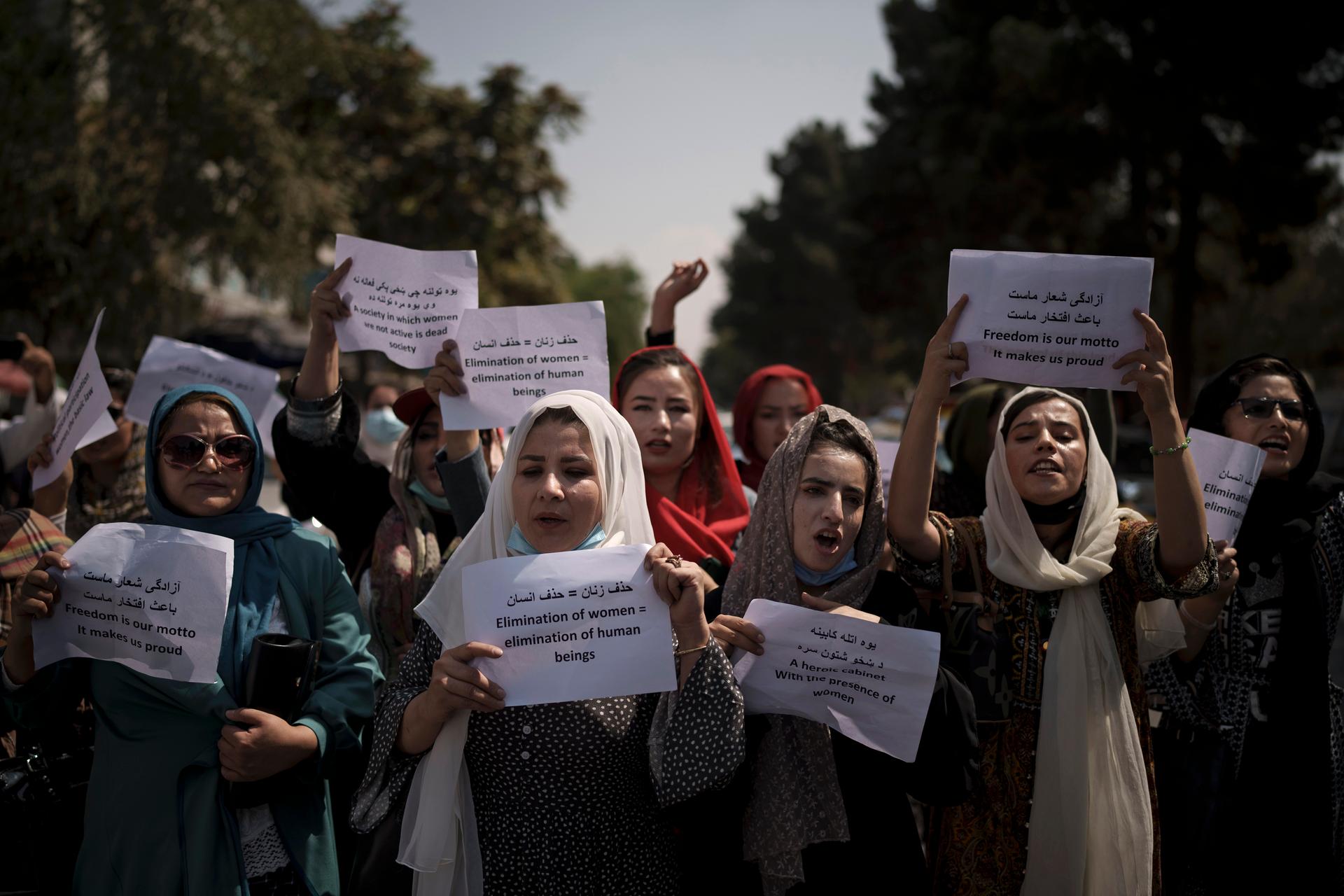Afghan women sidelined under new Taliban rule: ‘This country places no value on me as a woman’
Sixteen-year-old Morsal was asleep when the news broke last Friday.
When she woke up, she said, her younger sister rushed to tell her: “Have you heard? Schools are open again.”
Related: The Taliban want international recognition. Countries are debating.
It’s been weeks since their school in Kabul, Afghanistan, has been shut down amid the pandemic and the war, and so, this came as welcome news.
But for Morsal and her sister — whose full names aren’t being used to protect their safety — the joy was short-lived.
Since the Taliban’s takeover in the country, its Education Ministry has instructed boys from grades seven through 12 to go back to school, but it has made no mention of girls — and the future of education for millions of female students is unclear.
The Taliban’s announcement shocked many in Afghanistan. This past weekend, there were protests in cities like Kabul and Herat in the western parts of the country.
“You took away my country. Don’t take away my studies, too.”
“You took away my country,” women in Herat city chanted. “Don’t take away my studies, too.”
The demonstrations were small, however, — a number of Afghans told The World they were too scared to show up because the Taliban have been flogging and arresting those in attendance.
The Taliban have banned unauthorized protests. And they don’t give permission for anti-Taliban protests.
Dreams on hold
Morsal said no one had ever told her she can’t study.
“I want to know why boys can go back to school and follow their dreams and I can’t?” said Morsal, who added that she cried for hours after learning that girls are being excluded from school.
Morsal, who has only one year of high school left, wants to be a graphic designer. Now, she says, everything is on hold.
Another female student in Kabul, Nasiba, who is 10 years old, said the Taliban can’t just imprison women and girls at home.
“They must understand that this country won’t prosper without women,” she said.
Nasiba wants to become a doctor, and she doesn’t want to study at home.
“I want to be with my friends and teachers,” she said. “I want to be brave.”
“The situation is very upsetting. The Taliban are silencing and eliminating Afghan women from public life.”
“The situation is very upsetting,” said one school principal in Kabul, who asked not to be named for safety reasons. “The Taliban are silencing and eliminating Afghan women from public life.”
Normally, she oversees 8,000 students in Kabul. Middle and high school girls make up 6,000 of them, she said.
Related: Afghan women to the Taliban: #DoNotTouchMyClothes
Her students have been calling her, trying to make sense of what is happening.
She said she tells them to be patient, but she is worried, too.
“I don’t know what plans they have for female students in the future but in the past they were against women studying and working,” she said.
The principal has four daughters. One of them, who’s out of school now, came to visit her on Friday.
She said her daughter told her: “Mom, if I leave Afghanistan, I don’t ever want to come back. This country places no value on me as a woman.”
Her daughter’s words were really painful, the principal said, wiping away her own tears.
‘Technical issues’
Saeed Khosti, a member of the Taliban’s cultural commission, told Afghanistan’s Tolo News that girls weren’t banned from school.
“There are just some technical issues that need to be solved.”
“There are just some technical issues that need to be solved,” he said.
Related: Taliban’s ‘Islamic Emirate of Afghanistan’ is based on specific ideology
But many Afghans say they don’t buy this.
They say that Friday’s news is the latest in a series of moves by the Taliban that have sidelined women. For many, all of this is in line with the brutal way the group governed Afghanistan the last time it was in power.
“Everything has changed,” the school principal said. “We are going back to the 1990s.”
Recently, the Taliban shut down the Ministry of Women’s Affairs and replaced it with the much-feared Ministry for Propagation of Virtue and Prevention of Vice.
During the Taliban’s previous reign, the ministry charged the so-called morality police with enforcing its strict interpretation of Islamic religious law, known as Sharia.
Women were beaten for dressing “immodestly” or going outside without a male guardian.
Also, rules about whether female employees can go back to work have been vague and constantly shifting.
On Sunday, Kabul interim Mayor Hamdullah Namony said that women municipal workers in Kabul should stay home unless they hold “positions that men could not fill or that were not for men.”
Those jobs include some in the design and engineering departments and the attendants of public toilets for women. Namony did not say how many female employees were forced to stay home.
The Taliban have also ordered that university students be segregated by gender.
Our coverage reaches millions each week, but only a small fraction of listeners contribute to sustain our program. We still need 224 more people to donate $100 or $10/monthly to unlock our $67,000 match. Will you help us get there today?
